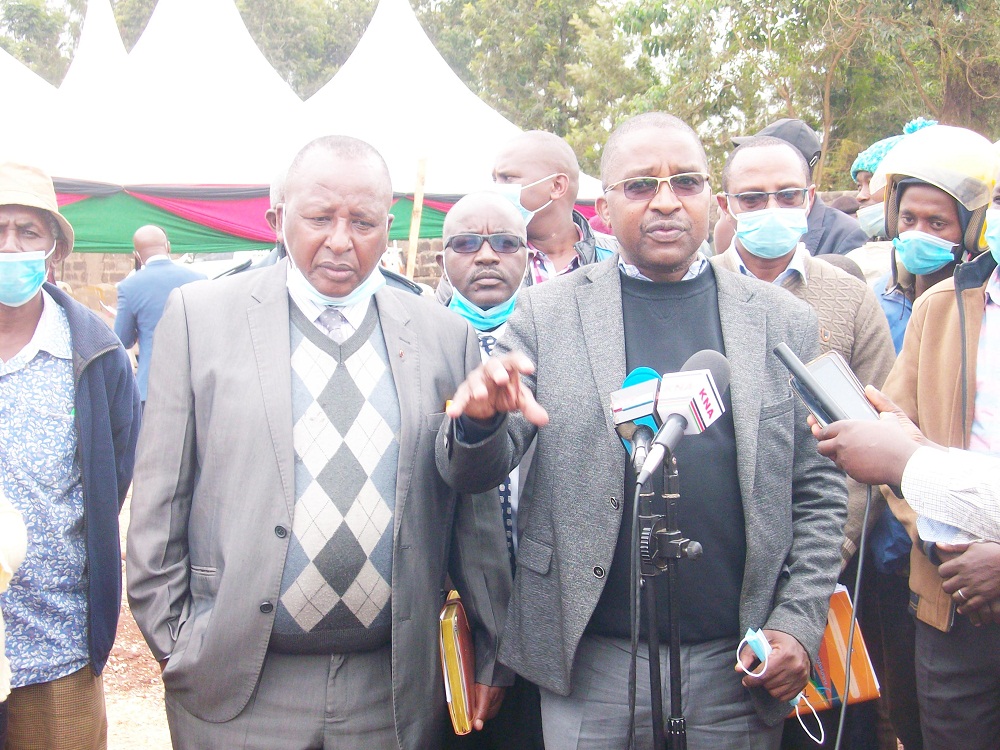By Kamundia Muriithi and Kage Njoroge
Coffee farmers in Kirinyaga County have sought to have majority representation in the Coffee Board of Kenya (CBK), under the proposed Coffee Bill 2021.
The growers want to have their own make 80 percent representation at the board, and to have a coffee farmer as the chairman.
They told the Parliamentary Committee on Agriculture and Livestock chaired by the Moiben MP Hon. Sylus Tiren that farmers understand the sub-sector are best placed to address coffee issues.
During a public participation on the Bill held at the General Kassam Njogu stadium in Kianyaga town, the farmers said they were opposed to the move by the State appointing non-growers as Board members.
Justus Waweru, a coffee farmer, said they were opposed to the Bill proposal that the board chairman be an appointee of the president.
“We want the Board chairman to be elected from amongst ourselves. It would be unfair to have non-growers as the representatives at the board since they do not understand the sector,” he told the committee.
A farmer Cecily Wanjiku called on the Committee to deal with the cartels that she indicated have infiltrated the coffee industry for many years reaping from the farmers’ efforts.
She said if the cartels were eliminated through the proposed reforms, coffee farming would resume its lucrative glory of yesteryears.
Gichugu MP. Hon. Gichimu Githinji said once the Bill was actualised as law, it will lockout such cartels from the value chain.
The committee chair Tiren said the cartels cited were responsible for the chaotic situation the entire agricultural sector was in, but remedial measures through the necessary legislations were underway to get rid of the malpractices.
“I want to assure the farmers that the sector is set to change for the better with inputs from the committed stakeholders,” he said.
Under the proposed law, the hawking of cherry has been outlawed.
According to Hon. Githinji, any committee member found culpable of corruption will be arrested and prosecuted and where necessary his property attached to recover the stolen money.
He added that farmers will have a reorientation at the milling facility to ensure proper grading is done without any malpractice.
A committee member and Githunguri Legislator Gabriel Kago pointed out at farm gate cherry coffee buyers as some of the cartel chain; alongside some corrupt coffee society committees, millers and marketers as those involved in the illegal practice.
Kago encouraged the Kirinyaga coffee farmers that their future appeared bright if they kept producing quality coffee.
“When I look at the statics provided by the Kirinyaga county government, the estate farmers produce 300,000 kg of cherry while the cooperative societies produce 5 million kg wich is 15 percent of the total national production and which is the best quality world over making me believe that the future of this cash crop, lies within your county,” the MP said.
He contrasted that the estate farmers from Kiambu County produce 6.5 million kg of cherry while their local Cooperative society counterparts only delivers 1 million, translating to about 20 percent of the total national production from the 32 coffee-growing counties.
The Bill has also proposed a limit of the term of office for the coffee cooperative society management, which will now allow two, three year terms.
The Committee heard that there were certain management members who had served in such capacities for more than 20 years.
The farmers also proposed that each of the 32 crop-producing counties should have their own mills to cut on transport costs and risks involved taking the commodity to the private millers.
MP Githinji who was the host said the Bill had gone through the first reading in parliament.
Meanwhile, to reposition itself as a competitive coffee producing region, Murang’a Farmers Co-operative Union has crafted a number of innovative strategies aimed at tackling persistent woes which engulf the highly potential coffee industry.
Coffee production rate in Muranga County has sharply plummeted in recent decades due to various challenges that undermine progress within the sector.
Notable obstacles include corruption in the management of primary coffee societies, unfriendly policies and legal frameworks which do not favor the framers, unpredictable prices, high cost of inputs, obsolete technologies and decreasing land space among other issues.
The chairman of Mooring’s Farmers’ Co-operative Union, Francis Guthega Ngone explains that to revamp the sector a raft of measures needed to be implemented.
Ngone expounds that the strategies will address the entire coffee production chain to empower the small holder growers to manage the business effectively.
He stated that the union, which has over 100, 000 affiliated coffee growing members is constructing multimillion coffee milling plants to address industrial processes of the crop.
Speaking during the ground breaking ceremony of the proposed coffee mill at Ikundu farm near Maragua town, Ngone said the facility will create more benefits that would go to the coffee framers.
The mill is owned by the famers through shareholding by the co-operative union and societies. The co-operative union will independently operate the mill and marketing of the produce.
The chairman recalled that the county has had good history of being a major coffee producer before failures occasioned by malpractices emerged.
Among the strategies lined up to attract the farmers back to the farming fields are a guaranteed minimum price of Sh70 per kilogram of cherry sold to the mill. On offer also is prompt payment within a set time frame.
The industry will be rebranded and primary pulping factories be provided with latest machineries and technologies to improve quality and efficiency at the basic level.
Further, Ngone pointed out at plans to replace the old coffee varieties with new because they were prone to coffee diseases and the other emerging climatic issues.
The new coffee varieties which include Batian and Ruiru 11 developed by Coffee Research Foundation would do very well in the region compared to the varieties that came earlier.
Ngone pledged to support the farmers get the varieties where they would be supplied with certified seeds to their factories and distributed to members for planting.
He gave details of a holistic approach to the production process from professional agronomy extension officers to be posted to train farmers on best growing methods.
The union will provide organic inputs and agronomy services to ensure quality and quantity production from farmers.
The union’s General Manager J. B. Kirigwi adds the milling plant has also acquired a brokerage license which allows the facility to market the crop competitively.
He disclosed that 32 coffee societies have been issued with licenses to establish certified coffee breeding nurseries to raise new variety seedlings for distribution to farmers.
Kirigwi says the union’s 60 acre coffee farm where the mill is being set up will be used as a model coffee for teaching and demonstration, therefore addressing the entire coffee value chain process.
The GM pointed that the recent records show co-operative societies in this county produced some 20 metric tonnes of coffee which fetched Sh1.44 billion, showing a sharp drop from previous decades when region used to produce over 120 metric tonnes.
Kirigwi is confident that the challenges which frustrated the producers will be tackled by the new strategies and pave way for the revival of the industry in this county.
He said the package include interventions measures geared to attract young people to embrace coffee framing as platform of employment and income- generating opportunities.
Kirigwi says the strategies further brings modern liquoring laboratories, roasting, grading and packaging functions at the milling plant in line with set quality standards.
To develop systems towards increasing productivity, the union is working with the county government to provide supportive infrastructures. These involve improvement of access road networks and enactment of new coffee laws towards creating a conducive business friendly, farming environment.
Muranga’s Governor Mwangi Wa Iria presided over the ceremony to kick start construction of the coffee mills. He promised to provide support to revamp coffee industry in the county.



